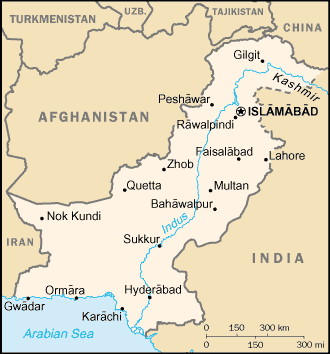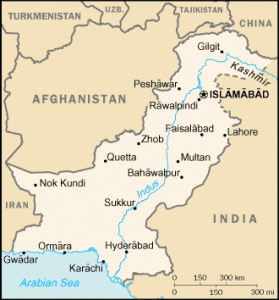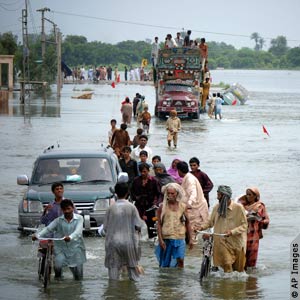
Against the Global Trend: Pakistan’s Reversal on Climate Change Policy
 In a country vulnerable to floods, cyclones, and drought, Pakistan is currently “bucking the trend” when it comes to combating global climate change, according to a recent Dawn newspaper article. Pakistan dramatically cut its development budget for fighting climate change from Rs168.1 million ($1,686,000 USD) in 2012/13 to Rs58.8 million ($590,000 USD) in 2013/14, as well as downgrading the climate change ministry to a division.
In a country vulnerable to floods, cyclones, and drought, Pakistan is currently “bucking the trend” when it comes to combating global climate change, according to a recent Dawn newspaper article. Pakistan dramatically cut its development budget for fighting climate change from Rs168.1 million ($1,686,000 USD) in 2012/13 to Rs58.8 million ($590,000 USD) in 2013/14, as well as downgrading the climate change ministry to a division.
Importantly, Pakistan faces possible international isolation from global climate change groups due to its inefficiency in dealing with these environmental difficulties, according to Dr. Qamaruz Zaman Chaudhry, leading author of Pakistan’s National Climate Change Policy. Furthermore, Pakistan’s lack of representation at international forums and conferences regarding climate change reinforces the idea that the country does not take the threats seriously.
An example of the significant disadvantage Pakistan faces with its current attitude is it will have no share in the Green Climate Fund. The Green Climate Fund was established in 2009, in accordance with the United Nations Framework Convention on Climate Change (UNFCCC). The Fund seeks to raise $100 billion per year by 2020 and allocates money to support various projects, programs, and policies in developing countries.
Pakistan’s attention to climate change also pales in comparison to its regional neighbors of India and Bangladesh. India currently spends over 2.6% of its total gross domestic product (GDP) dealing with climate change challenges. Consequently, it receives large amounts of aid from the Green Climate Fund.
As one of the most climate-vulnerable countries in the world, Bangladesh has taken dramatic steps to fight climate change, too. Bangladesh established a national Climate Change Resilience Fund and a national Climate Change Trust Fund, raising over $300 million to deal with climate change effects.
Pakistan did take an important step this past February by creating a National Climate Change Policy. In it, Pakistan outlined policy measures to cope with climate change; however, the targets have not been met. It appears, too, that the  government shares a similar view with its citizens on the importance of climate change, of which only fifteen percent of Pakistani citizens in a recent Pew Research Center survey view climate change as a major threat.
government shares a similar view with its citizens on the importance of climate change, of which only fifteen percent of Pakistani citizens in a recent Pew Research Center survey view climate change as a major threat.
Pakistan’s underwhelming commitment to dealing with the effects of climate change stands in stark contrast to the threat it faces. Environmental experts believe that the average annual financial losses in Pakistan due to environmental degradation is approximately Rs450 billion ($5.2 billion USD). This is in addition to recent catastrophic natural disasters like the 2010 Pakistan floods, which caused an estimated $43 billion in damage and killed over 1,700 people.
It is in Pakistan’s vital interest to prioritize climate change as a major threat. In a country already threatened by destabilizing forces, such as terrorism and food and water insecurity, climate change may further exacerbate these factors, creating an even costlier result.






[…] Against the Global Trend: Pakistan’s Reversal on Climate Change Policy […]
[…] Against the Global Trend: Pakistan’s Reversal on Climate Change Policy Evan Meltzer […]